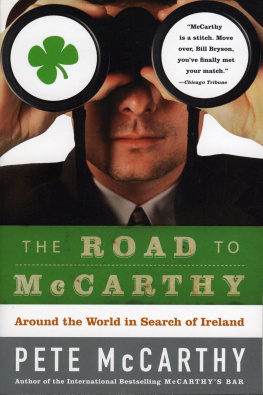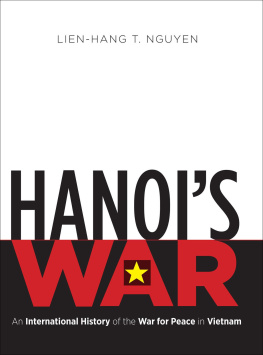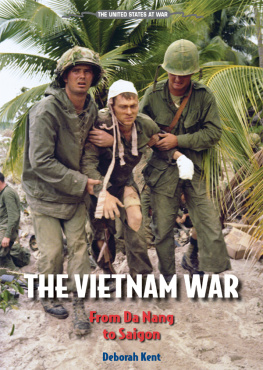
Vietnam
Mary McCarthy

To Jim
The Home Program
I CONFESS THAT WHEN I went to Vietnam early last February I was looking for material damaging to the American interest and that I found it, though often by accident or in the process of being briefed by an official. Finding it is no job; the Americans do not dissemble what they are up to. They do not seem to feel the need, except through verbiage; e.g., napalm has become Incinderjell, which makes it sound like Jello. And defoliants are referred to as weed-killerssomething you use in your driveway. The resort to euphemism denotes, no doubt, a guilty conscience orthe same thing nowadaysa twinge in the public-relations nerve. Yet what is most surprising to a new arrival in Saigon is the general unawareness, almost innocence, of how what we are doing could look to an outsider.
At the airport in Bangkok, the war greeted the Air France passengers in the form of a strong smell of gasoline, which made us sniff as we breakfasted at a long table, like a delegation, with the Air France flagour bannerplanted in the middle. Outside, huge Esso tanks were visible behind lattice screens, where U.S. bombers, factory-new, were aligned as if in a salesroom. On the field itself, a few yards from our Boeing 707, U.S. cargo planes were warming up for take-off; U.S. helicopters flitted about among the swallows, while U.S. military trucks made deliveries. The openness of the thing was amazing (the fact that the U.S. was using Thailand as a base for bombing North Vietnam was not officially admitted at the time); you would have thought they would try to camouflage it, I said to a German correspondent, so that the tourists would not see. As the 707 flew on toward Saigon, the tourists, bound for Tokyo or Manila, were able to watch a South Vietnamese hillside burning while consuming a cool drink served by the hostess. From above, the bright flames looked like a summer forest fire; you could not believe that bombers had just left. At Saigon, the airfield was dense with military aircraft; in the civil side, where we landed, a passenger jetliner was loading G.I.s for Rest and Recreation in Hawaii. The American presence was overpowering, and, although one had read about it and was aware, as they say, that there was a war on, the sight and sound of that massed American might, casually disposed on foreign soil, like a corporal having his shoes shined, took ones breath away. They dont try to hide it! I kept saying to myself, as though the display of naked power and muscle ought to have worn some cover of modesty. But within a few hours I had lost this sense of incredulous surprise, and, seeing the word, hide, on a note pad in my hotel room the next morning, I no longer knew what I had meant by it (as when a fragment of a dream, written down on waking; becomes indecipherable) or why I should have been pained, as an American, by this high degree of visibility.
As we drove into downtown Saigon, through a traffic jam, I had the fresh shock of being in what looked like an American city, a very shoddy West Coast one, with a Chinatown and a slant-eyed Asiatic minority. Not only military vehicles of every description, but Chevrolets, Chryslers, Mercedes-Benz, Volkswagens, Triumphs, and white men everywhere in sport shirts and drip-dry pants. The civilian take-over is even more astonishing than the military. To an American, Saigon today is less exotic than Florence or the Place de la Concorde. New office buildings of cheap modern design, teeming with teazed, puffed secretaries and their Washington bosses, are surrounded by sandbags and guarded by M.P.s; new, jerry-built villas in pastel tones, to rent to Americans, are under construction or already beginning to peel and discolor. Even removing the sandbags and the machine guns and restoring the trees that have been chopped down to widen the road to the airport, the mind cannot excavate what Saigon must have been like before. Now it resembles a gigantic PX. All those white men seem to be carrying brown paper shopping bags, full of whiskey and other goodies; rows of ballpoints gleam in the breast pockets of their checked shirts. In front of his villa, a leathery oldster, in visored cap, unpacks his golf clubs from his station wagon, while his cotton-haired wife, in a flowered print dress, glasses slung round her neck, stands by, watching, her hands on her hips. As in the American vacation-land, dress is strictly informal; nobody but an Asian wears a tie or a white shirt. The Vietnamese old men and boys, in wide, conical hats, pedaling their Cyclos (the modern version of the rickshaw) in and out of the traffic pattern, the Vietnamese women in high heels and filmy ao-dais of pink, lavender, heliotrope, the signs and Welcome banners in Vietnamese actually contribute to the Stateside impression by the addition of local color, as though you were back in a Chinese restaurant in San Francisco or in a Japanese sukiyaki place, under swaying paper lanterns, being served by women in kimonos while you sit on mats and play at using chopsticks.
Perhaps most of all Saigon is like a stewing Los Angeles, shading into Hollywood, Venice Beach, and Watts. The native stall markets are still in business, along Le Loi and Nguyen Hue Streets, but the merchandise is, for Asia, exotic. There is hardly anything native to buy, except flowers and edibles and firecrackers at Tt time andoh yessouvenir dolls. Street vendors and children are offering trays of American cigarettes and racks on racks of Johnnie Walker, Haig & Haig, Black & White (which are either black market, stolen from the PX, or spurious, depending on the price); billboards outside car agencies advertise Triumphs, Thunderbirds, MGs, Corvettes, For Delivery here or Stateside, Payment on Easy Terms; non-whites, the less affluent ones, are mounted on Hondas and Lambrettas. There are photo-copying services, film-developing services, Western tailoring and dry-cleaning services, radio and TV repair shops, air conditioners, Olivetti typewriters, comic books, Time, Life, and Newsweek, airmail paperyou name it, they have it. Toys for Vietnamese children (there are practically no American kids or wives in Vietnam) include U.S.-style jackknives, pistols, and simulated-leather belts, with holstersI did not see any cowboy suits or Indian war-feathers. Pharmaceuticals are booming; young Vietnamese women of the upper crust are enrolling in the School of Pharmacy in order to open drugstores; and a huge billboard all along the top of a building in the central marketplace shows a smiling Negromaybe a long-ago Senegalese soldierwith very white teeth advertising a toothpaste called Hynos.
If Saigon by day is like a PX, at night, with flares overhead, it is like a Worlds Fair or Exposition in some hick American city. There are Chinese restaurants, innumerable French restaurants (not surprising), but also La Dolce Vita, Le Guillaume Tell, the Paprika (a Spanish restaurant on a rooftop, serving paella and sangra). The national cuisine no American wants to sample is the Vietnamese. In February, a German circus was in town. French wine is made in Cholon, the local Chinatown. In the night clubs, if it were not for the bar girls, you would think you were on a cruise ship: a chanteuse from Singapore sings old French, Italian, and American favorites into the microphone; an Italian magician palms the watch of a middle-aged Vietnamese customer; the band strikes up Happy Birthday to You, as a cake is brought in. The vice in Saigonat least what I was able to observe of ithas a pepless
Next page
















